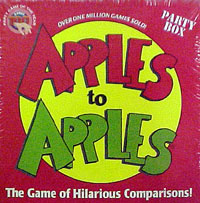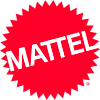| "The Game of Hilarious Comparisons!" | |
|---|---|
 The cover of the Apples to Apples Party Box | |
| Designers | Mark Alan Osterhaus, Matthew Kirby |
| Publishers | Pegasus Spiele, Out of the Box, Mattel |
| Publication | 1999 |
| Years active | 1999–present |
| Players | 4–10 |
| Setup time | 1 minute |
| Playing time | 30–75 minutes |
| Chance | Medium |
| Age range | 12 and up |
| Skills | Social skills |
| Related games | |
| Dixit, Say Anything, Cranium | |
| [1] | |
Apples to Apples is a card-based party game originally published by Out of the Box Publishing Inc., and now by Mattel. Players start with a hand of seven "red apple" cards, which feature nouns. A player is selected to be the first judge, and that judge plays a "green apple" card, which features an adjective. The round is won by playing the "red apple" card that the judge determines to be the best match for the "green apple" card. The role of the judge rotates, and the number of rounds is determined by the number of players. The game is designed for four to ten players and played for 30–75 minutes.
Contents
Apples to Apples was chosen by Mensa International in 1999 as a "Mensa Select" prizewinner, an award given to five games each year. [2] It was also named "Party Game of the Year" in the December 1999 issue of Games magazine [3] and received the National Parenting Center's seal of approval in May 1999. [4] The popularity of the game led to an increased interest in similar card-matching/answer-judging party games. On September 8, 2007, Out of the Box Publishing sold the rights for Apples to Apples to Mattel. [5]

